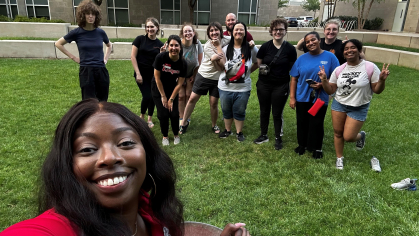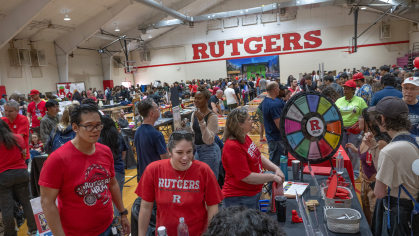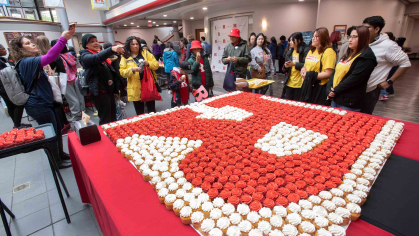Adults With Autism Get on-the-Job Training Through Rutgers Dining Services

Rutgers Dining Services employs an army to keep university staff, students and faculty well fed.
For a small number of those employees, their work preparing and serving meals isn’t just a job, it’s an opportunity to gain life skills – one that’s not always easy to come by for adults with autism.
In fact, employment is one of the most neglected aspects of autistic adults’ lives, said Christopher Manente, executive director of Rutgers Center for Adult Autism Services (RCAAS), noting that between half and three-fourths of autistic adults seeking work are unemployed.
“The lack of employment is just one of the indicators of a poor quality of life for this population,” said Manente. “It’s required to succeed at a lot of other aspects of adult life such as having health care, gaining access to transportation, consuming healthy food, or just having the independence and freedom to live your adult life.”
RCAAS, which began accepting participants in 2017, features four main programs that address participants’ needs for social support, clinical services, academic help, and integration into the workforce. One of these programs, Supporting Community Access Through Leisure and Employment (SCALE), focuses on elevating participants’ success in employment and independent life.

Today, 10 out of 21 total participants in the SCALE program work as part- or full-time employees at Dining Services in the Division of Student Affairs. If necessary, they receive one-on-one supervision with coaches from the Graduate School of Applied and Professional Psychology, who ensure that they can work as seamlessly as possible in their role with Dining Services.
“We’ve got people now in every single dining hall and several cash operations that come to work with their job coach every single day, and the staff members in Dining are happy to have them,” said Joe Charette, former director of Dining Services who began working at Rutgers in 1989. “They’re extremely dependable, and we think that it’s been a wonderful partnership.”
In fact, before RCAAS opened, Dining Services hired employees from the Douglass Developmental Disabilities Center, which was founded in 1972 and still serves children between the ages of 3 and 21 with autism spectrum disorders.
“In Dining Services, we do a lot of things that are quite mundane,” said Charette. “And it just so happens that for a lot of folks on the autism spectrum, repetitive tasks like washing dishes or setting tables might not be as mundane or annoying as they would be for others.”
Having a steady job has expanded the skill sets and horizons of several SCALE participants, said Whitney Pubylski-Yanofchick, a behavioral analyst at the RCAAS. That includes Scott, who started at Henry’s Diner and now works at Busch Dining Hall where he makes pizza for customers, and Chris, who works as a full-time employee in Busch Dining Hall.
Both have made strides while working at Dining Services, said Pubylski-Yanofchick. For example, Scott passed his ServSafe Food Handler Certification, no longer needs a one-on-one coach with him at work, and has learned to independently take the bus across campus. And Chris, who is now capable of cleaning his workspace, preparing food, making custom orders, has gotten a credit card and is looking at available apartments in the area.
“We want to make sure that each participant has a job that they want, and also that they become more independent,” said Pubylski-Yanofchick. “We’re there to see that they have the lay of the land, but they do the work themselves – inside and outside of the workplace.”


